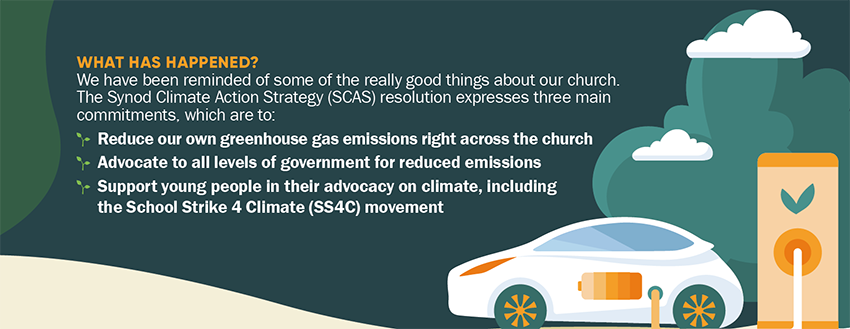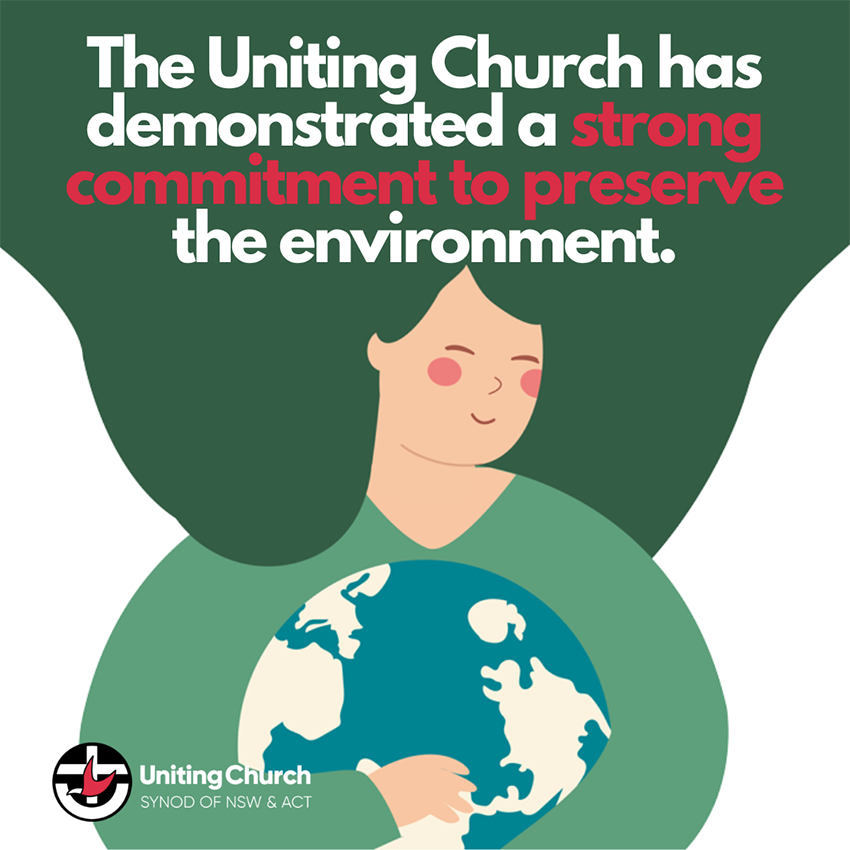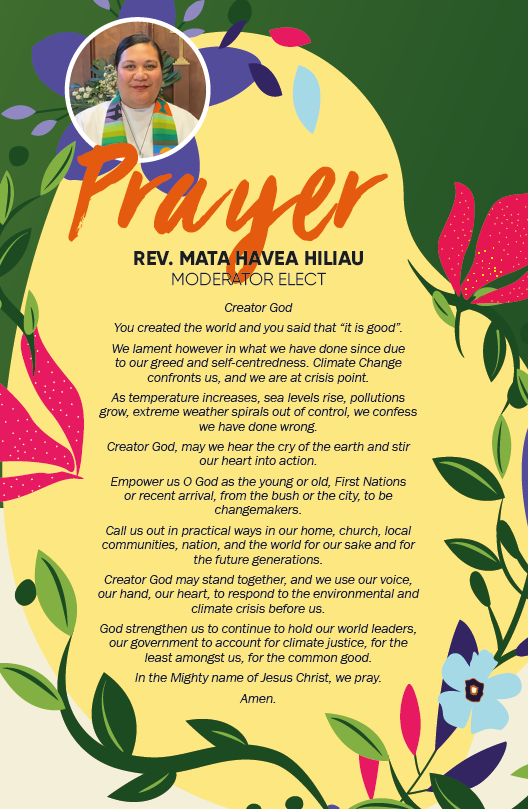Jon O’Brien from Uniting Climate Advocacy Network reflects on what we have done as a Church and what we have learned.
From alarming IPCC reports to the flooding recently experienced in parts of our Synod, climate change is a threat that is well and truly being felt. Knowing how to respond can be difficult in a context where our lifestyles centre on cycles of consumption and waste.
In 2019, the Synod of NSW and the ACT adopted a wide-ranging climate strategy to combat this problem. That strategy addressed everything from how the church can cut its own carbon emissions to how we may best lobby governments for better policy outcomes.
Again in 2021, the commitment to climate care was agreed through the Synod’s Future Directions strategy. As we see in this issue’s feature, this is more so much than an organisational strategy. It is a faithful response to God’s call to be stewards of the earth.

I was talking on the phone to Sigrid Hall from Gymea Miranda Uniting Church. It was an interview about why she and other church members had met with candidates in the federal seat of Hughes, to share their hopes for action on climate change. Sigrid told me that public advocacy was not usually her ‘thing’. Intrigued, I asked how she came to be involved.
She told me she had participated in the on-line webinar, Why Does the Uniting Church support the School Strike 4 Climate movement, in 2021. She found the Uniting Church young people speaking had such passion and clarity about the issue of climate change, and why they needed to act on it. “I found that quite inspiring,” Sigrid said. “I thought if they are doing it, what can I do?”. When she heard about training the Uniting Advocacy team was offering on having “Climate Conversations” with local Federal MP’s, she decided to get involved.
Both the SS4C webinar and climate conversations training were part of the Synod Climate Action Strategy, which was created by Synod resolution in 2019. The resolution grew out of passionate concern by grassroots members of the church, not least from young people in congregations and Uniting Church schools. Their urgent appeal for our church to act found strong support from the rest of Synod, and the resolution was passed nearly unanimously.

Reducing our own emissions
Since its inception the Uniting Church has demonstrated a strong commitment to preserve the environment. In the words of one Assembly resolution, it does this in recognition that “this groaning creation is God’s good creation”. All parts of the church have been active in this vocation. Initiatives by the Synod and its agencies, are covered elsewhere in this edition of Insights. Well before the SCAS, congregations and individual church members were involved in recycling, clean up days, community gardens and other environmental initiatives. A number of congregations have signed up to the Five Leaf Eco Awards, created by Uniting Church member Jessica Morthorpe. These awards encourage the many practical steps congregations can take to tread more lightly on the earth. More recently, consciousness of climate change has spurred others to find ways to reduce energy use and/or switch to renewable energy, like installing solar panels or taking up green energy options with their provider.
The SCAS has sought to encourage and build on the actions that members and congregations have already been taking. In the last two years we introduced forums as part of the Living the Change initiative. Living the Change promotes ways individuals and households can reduce their own greenhouse gas emissions. We have held three on-line seminars exploring different topics: installing solar panels; making our diets more sustainable and; electric vehicles. We have also conducted Living the Change workshops or talks in congregations both face to face and on-line.
Just last month we took part in a service focusing on care for the environment at Adamstown Uniting Church, organised by the members with Rev. Nerida Drake. The service celebrated the steps they were already taking – from worm farms, to reducing energy use in the home, to buying local produce – as well as prompting what the next steps could be. At morning tea afterwards one person remarked, “It’s a breath of fresh air to hear a church talking about these things.”
Support for young people’s climate advocacy
Since the first rally in 2018, there have been several major School Strike 4 Climate events. Uniting Church members and congregations have actively supported all these events. They have attended rallies face to face and on-line. They have put up encouraging messages on church notice boards, hung climate action banners on church buildings (65 of them), taken selfies and posted their support on social media. The Youth Climate Actions Task Group was established to build on this existing support and it has actively promoted each SS4C event and provided ideas on how members, congregations and UCA schools, could get involved.
At a SCAS planning conference in early 2021 participants set a goal to highlight the voices of particular groups in our church’s climate action. These were young people, First Nations people, the Pasifika community and rural people. In a service held at Pitt St Uniting Church before the May 2021 event in Sydney, all these voices came together. This service was conceived, planned and led by young people, including First Nations and other students from UCA schools, Pasifika and rural young people, with the wider church attending in support.
One group has kept appearing at Sydney SS4C climate rallies, often seen wearing traditional garments. They are the Climate Action Group of the Auburn (Tongan) Uniting Church. They come out of passionate concern about the impacts of climate change in Australia and in their home islands. After one SS4C event we asked their Minister, Rev. Mosese Taufa, why they kept coming, when change was sometimes hard to see. He replied that for their group and for Pasifika people, climate change was not a ‘story’ but an experience, bringing hardship and threatening the very existence of their home islands. Asked what action he would like Australian leaders to take he said, “I would like to see that they think about us,” and recognise that what Australia does, affects the Pacific as well.
Climate concern crosses geographical boundaries. It is rural communities who are often most aware of the impacts of climate change. In Parkes, Libby Hoyle had grown up with her family as part of the local Uniting Church. She had also grown up with droughts and bushfires. In 2020 and in Year 12 at Parkes High School, she decided to organise the first ever SS4C event in the town. It made sense in looking for speakers, to turn to fellow Parkes UC member Neil Westcott. Mr Westcott is a fifth-generation wheat and barley farmer in nearby Alectown.
Though from different generations Ms Hoyle and Mr Westcott shared a deep concern about climate change and anger at the way climate policy had been turned into a political football. “I am a farmer’s son who has been a conservative voter all my life”, Mr Westcott said, “but the spin doctors need to get out of the room.” Parkes’ first SS4C event was attended by around 80 people and sparked a lot of conversations in church and town. Libby finished her own speech that day by saying, “I have to believe that actions like this can make a difference.”

Advocating to government for changes in climate policy
The yearning to make a difference that Libby expressed has motivated other church members to advocacy in the public sphere. Many members have joined with others calling on government to take stronger action on climate. They have worked through organisations like The Australian Conservation Foundation, the Australian Religious Response to Climate Change, Common Grace and more. They have written letters and emails, attended prayer meetings and held vigils outside MPs’ offices.
The SCAS has encouraged and promoted this public advocacy. In addition, in 2020 we started the Climate Conversations initiative. We asked Uniting Church members to form small groups to seek meetings with their local Federal MPs. The aim was to share their concerns about climate as citizens and Christians, and explain what climate actions they wanted the next government to take. We held a briefing attended by about 35 people. We then provided three online training sessions on holding effective meetings. The groups then approached their respective MPs to secure an appointment.
In the end, about 30 Uniting Church members were involved in meetings with sitting MPs or candidates in 11 seats, either by themselves or partnering with other organisations. Eleven seats represents 22 percent of all federal electorates in NSW and the ACT. In all these ways our church was an active contributor to the public discussion and shift in attitudes that resulted in the latest federal poll being dubbed the ‘climate election’.
Raul Sugunananthan took part in one of those MP meetings. Mr Sugunananthan worships at Leichhardt Uniting Church and has been an active member of Christian Students Uniting, including their action on climate. Along with others, he met with his federal MP, Tanya Plibersek, now the Environment Minister. Mr Sugunananthan took part, he said, because he believes Christians are called to care for the environment. He said he found the meeting more daunting than he expected, but that he learned a lot. He was surprised when, at the end of the time, Ms Plibersek thanked them for the advocacy work of the Uniting Church. Ms Plibersek that everyday people in church and community are needed to speak out on issues they care about, if we are to see positive change.
That speaking out was evident at a climate election forum on 27 April at Penrith in Western Sydney. It was led by the Uniting Church Pasifika community, including our Moderator Elect, Rev Mata Havea Hiliau. More than 200 people gathered at Penrith Panthers club to hear Shadow Minister for Climate Change, Chris Bowen, speak and answer questions about climate policy.
Unfortunately, no then-government representative had responded to our invitation. It was a vibrant, passionate gathering and Mr Bowen could not have been left in any doubt about the importance of climate change to our church and its Pasifika members. At the forum he agreed publicly to a follow-up meeting with the organisers, should his party form government. That meeting is now being sought.
What qualities have we been reminded of?
Action on climate is part of our mission to care for creation. But the way the Synod Climate Action Strategy has unfolded reminds us of some of our church’s best features.
The Uniting Church is a grassroots movement: All parts of the church have been involved in the SCAS, but it is everyday members and congregations that have made it alive and real. Over the last two years around 1200 participants have taken part in SCAS related events (mostly on-line). The vast majority have been Uniting Church members coming from around 170 different congregations.
We know faith must be put into action: The National Church Life Survey tells us that 81 percent of Uniting Church members believe that care for creation is part of the mission of the church. Sometimes we know, beliefs don’t show in behaviour. While there is always room for improvement, our church has been acting on this conviction, seeking positive change in our church and world. We also know we can’t bring about change just by ourselves, so we cooperate with others with whom we share common values and purpose.
Our diversity is a strength: The Uniting Church is diverse. We come from different cultures and backgrounds, we are of different ages, we embrace a range of political views and we live across urban, regional, rural and remote communities. Yet we are bound together in common humanity, faith and mission. In the SCAS we have found that voicing our different perspectives and sharing our deeply held convictions and passionate concerns has been both energising and unifying. COVID has provided an upside as well. Shifting many events on-line has meant more members from rural and regional communities can participate. More than half the participants in SCAS related events in the past two years have been from congregations beyond Sydney.

What is next for the Synod Climate Action Strategy?
We will continue to call and work for a transition to a safer climate future. This of necessity involves the shift to renewable energy and away from reliance on fossil fuels. All communities, including those currently dependent on fossil fuels, must be supported in this transition. We will continue to work to reduce our own emissions. Our National Assembly has committed to our being a carbon neutral church by 2040. Our Synod Future Directions statement names climate action as a core commitment.
At a climate organisation meeting recently, one of the organisers was reflecting on the scale of the challenge before us. She admitted to feeling daunted at the degree of change needed, but then she added emphatically, “I’m not interested in fighting for a survivable future, I’m fighting for a beautiful, thriving future.”
As a church, perhaps the most important thing we can do is to tell and live out our story. In our climate action we bear witness that God’s purpose and intention for the world, is not division and destruction, but in the words of the Basis of Union, the “coming reconciliation and renewal which is the end in view for the whole creation”. Fidelity to that mission calls us to keep taking the next step.
Jon O’Brien, Uniting Climate Advocacy Network












